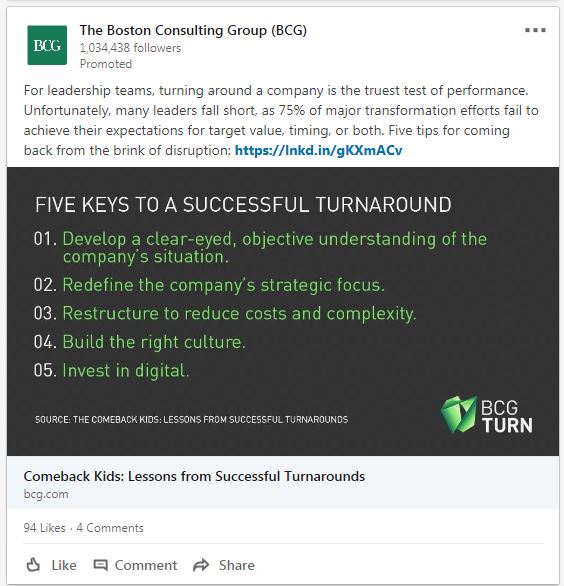
Last month we took a little detour from personal growth and finances to corporate growth and finances when I wrote about the 5 keys to a successful turnaround. What I have realized, though, is that those same principles also apply to our personal lives. This is particularly true if you are trying to lead a deliberate and purposeful life, and don’t just want to cruise from cradle to grave. In other words, they can be quite helpful if you need to perform a “you-turn”.
But what if I like my life? Why do I need to turn it around?
Maybe you do. And maybe you don’t. But following these steps will provide you with a good indication either way!
So let’s take a look at the 5 keys from the post that hit my LinkedIn feed from the Boston Consulting Group, a major international consulting firm:
Now let’s dive in.

Develop a clear-eyed, objective understanding of your situation.
Are you satisfied with where you’re at?
How are your relationships with coworkers, family members, and friends? Do you have deep, meaningful relationships with at least a small number of people? Are you comfortable asking others for help, or to borrow a mitre saw, or a cup of sugar? Are others comfortable asking you the same thing? Have you asked for forgiveness from those you’ve wronged, and forgiven those who have wronged you?
What about your finances? When was the last time you calculated your net worth? Your present cash flow? Your future cash flow? Are you swimming in debt or are you flying along towards financial independence? Or somewhere in the middle? Perhaps more importantly, are you pretending to be richer than you are, and in the process robbing yourself of true wealth-building opportunities? Remember, the millionaire next door often drives a Civic. Or a Corolla.
Then there’s the issue of faith. Have you earnestly explored your beliefs, or just cruised along and assumed that faith is a crutch for the weak?
Don’t forget your physical health. Are you eating (reasonably) well, getting some semblance of exercise, sleeping enough, and generally taking good care of your mind and body?

Redefine your strategic focus
If you’re honest with yourself, I’m sure you’ll see that there are plenty of areas in life where there’s room for a you-turn. Which then brings you to the big decision: What are you going to do about it?

See, now that you have a clearer understanding of your personal situation, you can begin to make deliberate choices about what (if anything) to change.
In our case, my wife starting preparing healthier meals a few years ago. She also started taking exercise classes. And then last year I started biking to work and making sure I had enough sleep most nights. We have felt much better and more energetic as a result of these simple but effective measures.
You might realize that you need to spend more time with your family, building into your spouse and kids. Or perhaps you need to take better control of your finances, even if it means taking on an extra job for a year or two. Whatever it is, it will flow out of the self-assessment that you started with.
Just don’t try and tackle everything at once, or you might get overwhelmed. Choose something simple to start with and score a small, quick win to build some encouragement!

Restructure to reduce costs and complexity.
Let’s say you’ve decided on a new strategic focus for your life. Or at least a mini-strategy to improve a core area that you’ve identified. The problem is, you don’t have any time to do it. Sure, it might be nice to home-cook more meals instead of eating out, or it might be nice to walk the kids to school instead of driving them. But life is complicated, busy, and hard.
So change it.
As a frugal person, it pains me to say this, but it’s true: Sometimes it is better to pay more for something that you could still do yourself if it buys you more time and energy to help you focus on your core strategy.

Go ahead: hire a landscaper. Or a cleaner. Or a buy those shoes at full price. But only if you’ve exhausted all other possibilities and you will use the time and energy saved to drive towards your real goals.
For example, I remember looking for new shoes a few years ago. They had to fit a certain way, be a certain style, and of course be a certain price. But it was so hard to find anything, I eventually gave up and spent a few bucks more to save the headache. By that time I had wasted an entire day shopping, and it was taking its toll.
On the other hand, you still need to cut unnecessarily costs, thus freeing up precious resources to chase your true purpose and goals. You don’t have to be pinching pennies or giving up your daily Timmies, just know where your money is going and be deliberate about where you want it to go. Some people value gobs of data on their phones; we don’t. Others need that daily caffeine fix. Regardless, spend where it brings you meaning and true happiness, and cut where it just brings the impression of meaning and happiness.

Build the right attitude.
Culture in the workplace is all about the right attitude individually and as a collection of individuals. If you have a bad attitude, you’ll see everything as negative, everybody as out to get you, and every challenge as something to be avoided.
Instead, choose to have joy in all situations, even the difficult ones. If you have such an attitude, you will be happier in general, and you will tackle challenges for the learning opportunities that they often are. I read somewhere recently that “Everything good in life is hard.” How true that is!
Step into the difficulty, persevere in the face of obstruction, and stick your strategy of improvement.

I know of several grumpy people, and nobody wants to be around them. We would much rather interact with positive, can-do focused people who try to solve problems instead of perpetuate them. So be the problem-solver with the right attitude.

Invest in digital.
Ok, so perhaps this one is more connected with the corporate world than personal improvement. Sure, you could use social media to hang out with people and stay connected. But maybe the key point here is to connect this with #3, restructuring to reduce costs and complexity.
For example, do your banking online. File your taxes online. Shop online. Set up any bills you trust to be auto-paid. Use apps to keep your inbox under control, help your kids learn to read, and stay on top of your appointments.
Most of us already do this a fair amount, but consider taking it to the next level. Build it into a system or a system of systems, so you can digitize and automate the tedious stuff you don’t enjoy. Like setting your thermostat. Or tracking your finances. Or monitoring the fuel economy in your car vs. your driving habits.
In Conclusion
We all could use a you-turn to a certain degree. Maybe it’s not a full 180, but a minor course correction. In fact, if we’re honest with ourselves, we should be constantly reviewing, tweaking, and improving. Just don’t obsess over it, lest you lose focus on why it’s important in the first place.
 Your Turn Now!
Your Turn Now!
What major steps or conclusions have you come to for yourself? What is the big strategy that you plan on focusing on? Any cool tips or suggestions you’d like to share?


 Your Turn Now!
Your Turn Now!







Your Turn Now! What's On Your Mind?